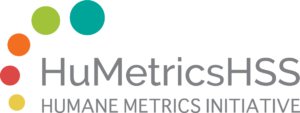Today is the Day Two of the Triangle Scholarly Communication Institute, where I'm heading up a team that's focusing on HuMetrics: Building Humane Metrics for the Humanities. Our team has focused a lot on the importance of working out loud, of process over product, and agreed that we would each take 20 minutes once or twice a day to blog, pomodoro style, about what we’ve been up to. In other words, don’t expect polished prose; this is pre-alpha humetrics-in-the-making.
We started off team time today by clustering the 20–30 values that we believe would enhance and enrich humanities scholarship under five headings: Equity, Openness, Collegiality, Quality, and Community. Taken together, these values could embody what the Greeks called arete, or excellence in practice; if we encompass them in our scholarly practice, they should have impact (see Stacy Konkiel’s post on influence vs. impact for what we understand by that).
I offered to write the post on community because it was a perceived lack thereof (in the humanities) that prompted me to leave academia. The infighting and backstabbing, the condescension and derision — these were not something I wanted to be a part of. And yet there's so much potential for things to be better. That's why we wanted to reverse engineer humanities metrics, to see if we could start from the things we value and then work out how to incentivize and measure practices that embody those values.
Under Community, we clustered engagement, network, holistic, attunement, and leadership. (Note: while I'm writing this, we're continuing today's discussion on Slack, and have decided, given conversations about posterity and future audiences that were part of this afternoon’s session, that preservation should also be included here.) It's a diverse list, to be sure (I'm sure you're scratching your head or stroking your beard or furrowing your brow just a little), but hopefully I can explain our thinking. That is, if I can remember our thinking — I'm beginning to believe there's such a thing as too much brainstorming.
Paying attention to community in scholarly life means fostering, cultivating, and participating in relationships and networks to which one gives and from which one takes. Like collegiality, it's about generosity and mentorship; it's about knowing when to lead and when to listen. It encompasses attunement because it asks us to be intentional about the connections we make and the way we enact them. One might create a community in the classroom, or acknowledge the full roster of people that contributed to the making of a book (is there really such a thing as a monograph?), or orient a class around service learning in such a way that it benefitted the larger community, the one beyond the academy. One might participate in a community by sharing data or code or primary source materials, by adding certain materials to a syllabus, or by opening up one's own creative process (rather than just the product) to critique and conversation. And being part of a community means thinking beyond the now, proactively considering the preservation of all elements of the scholarly record (from blog posts to conference papers to tweets and vines), thinking forward to the publics and communities that might find value or interest in our work ten, fifty, or one hundred years from today.
Follow team #HuMetrics as we wrestle with humanities metrics. We are Christopher Long, Rebecca Kennison, Stacy Konkiel, Simone Sacchi, Jason Rhody, and Nicky Agate, and we’ll be writing here all week.
